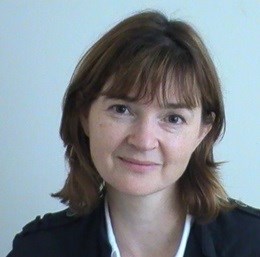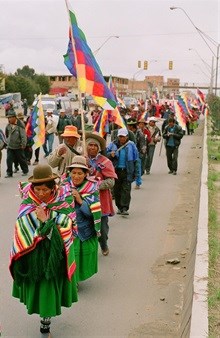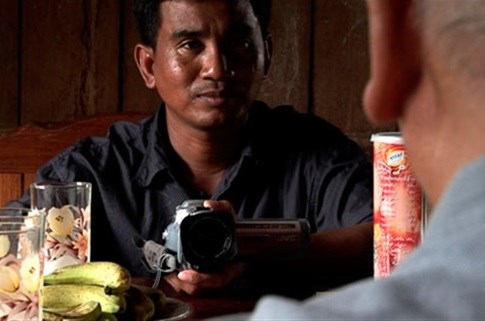If you're a DStv subscriber, you may have noticed that BBC World News kicked off the New Year with a new international documentary series titled Storyville Global. The twenty films, chosen and produced by the Why Foundation, are directed by different filmmakers and depict a range of contemporary political, cultural and human rights issues.

But what gives this doccie series more pull than others? For starters, Mary Wilkinson, Commissioning Editor for BBC World News, says it follows the successful Why Democracy and Why Poverty documentary series previously broadcast on BBC World News, so if viewers watched those, they'll have an idea of what to expect.
Wilkinson says they were extremely well made thanks to the collaborative funding model, as several public service broadcasters contributed to the budget via the not-for-profit Steps Foundation that co-ordinated the projects. She says while this investment helps, so does expert editing and the anecdotal reaction to these, from emails and comments in their viewers' panel, as this showed there is a genuine appetite for in-depth exploration of big global themes... if the storytelling is good enough. "That's the bread and butter of what we do on BBC World News, so it felt like the perfect fit," Wilkinson explains.
I asked Wilkinson a little more about the series and what makes documentaries so important in general...
 Let's start off with a brief description of the Storyville Global series.
Let's start off with a brief description of the Storyville Global series. Wilkinson: Storyville Global, which started on BBC World News this weekend, showcases an exciting range of high-quality documentaries from around the world. The first five titles give a real sense of the range. From one woman's political struggle in Bolivia, to the horrors of the Cambodian genocide, creeping nationalism in Russia, life in Taliban-held rural Afghanistan, and the world's largest Chinese restaurant, the series explores some of the biggest issues of our time. But it does so at a very human level, focussing on the extraordinary stories of individuals caught up in events.
 Why is now the perfect time for this series to be broadcast to a global audience?
Why is now the perfect time for this series to be broadcast to a global audience? Wilkinson: This has been true for a number of years now, but most of us are increasingly aware that what happens on the other side of the world can have a direct impact on us. Whether it's the rapid growth in China's economy, mass migration or radical jihadist groups, the world feels smaller and more connected. This is definitely driving interest in international news and more in-depth documentaries that help explain the world. BBC World News is watched by 76 million people every week, so there's clearly an appetite for global stories.
 Well said. Are any African stories featured in the Storyville Global series?
Well said. Are any African stories featured in the Storyville Global series? 
Wilkinson: Storyville Global is a 20-part series and we have only confirmed the first five so far. However, our commitment to showcasing the best African talent remains strong and we're talking to a number of African film-makers, including a South African director, about the potential to include their films in the series.
Beyond this, we also have a number of African voices on BBC World News and it's one of the things that makes us stand out from other international news channels. For example, BBC Nairobi's bilingual reporter Anne Soy, who was first on the scene to break the story of the Kenyan mall attack; Nomsa Maseko from the Johannesburg bureau, who spoke on the eve of Nelson Mandela's death about her experience, as a child, of hearing the news of his release from prison; and Milton Nkosi, who described the startling contrast of reporting for the BBC on the South African elections both after the end of apartheid in 1994 and in May last year. We were recently awarded for our dedication to covering African stories at this year's News and Documentary Emmy Awards for BBC World News America's Suffering in the Central African Republic. In a region and of a conflict that is generally underreported by other broadcasters, BBC World News brought this story into focus.
 Many people look to TV to relax and escape the harsh realities of life - why the need to focus on political, cultural and human rights issues, especially from an African perspective?
Many people look to TV to relax and escape the harsh realities of life - why the need to focus on political, cultural and human rights issues, especially from an African perspective? 
Wilkinson: I like escapism as much as the next person, but that doesn't mean I don't also enjoy a good documentary, even if it's on a tough subject. Often, the sheer resilience of the human spirit is evident and that can be encouraging and inspiring. Most people care about whether we live in a just, fair and peaceful world - even if they don't characterise that as an interest in 'politics' or 'human rights' - and well-made films that touch a chord and provide food for thought will always be in demand by audiences. Many documentaries also find clever, entertaining ways of exploring otherwise dry subjects. My favourite is the wonderful 2007 film Please Vote for Me by Weijun Chen, which followed a class of eight-year-old children in a Chinese school as they elect a class monitor. Ambitious parents coached and egged on their offspring who competed for the post and there were dirty tricks galore. As a tongue- in-cheek exploration of the pitfalls of democracy it was perfect, and even my son, who was ten at the time, watched avidly.
And we make sure it's not all doom and gloom. On BBC World News we have a number of programmes that look for the positive stories from the continent. For example, African Dream showcases inspirational stories across the continent from entrepreneurs sharing their ups and downs as well as the secrets of their success, and Africa Beats features musicians from all over the continent.

 Let's end with a bang - explain the importance of documentaries and what it takes for a documentary to work and not be seen as 'boring'?
Let's end with a bang - explain the importance of documentaries and what it takes for a documentary to work and not be seen as 'boring'? Wilkinson: There are so many different types of documentary that it is hard to be prescriptive. The best film-makers experiment and constantly surprise but to avoid 'boring' the viewer, it helps to have an original and powerful story, a strong cast of characters and a clear idea of what the film is trying to say or reveal.
Film-makers should be disciplined and constantly ask themselves whether every scene needs to be in the final cut - is it essential, does it move the story on? It's much like making a feature film, but the importance of documentaries is that they deal with truth rather than fiction. The best ones become a record of contemporary history that forty, fifty years from now will remind people of the social and political attitudes and circumstances of the time.

Certainly true of the Storyville Global series. It continued on BBC World News (channel 400) this weekend with My Afghanistan - Everyday Stories of Bombs and Bullets by Nagieb Khaja on Saturday, 17 January at 17:10 and again on Sunday, 18 January at 11:10 and 22:10.
